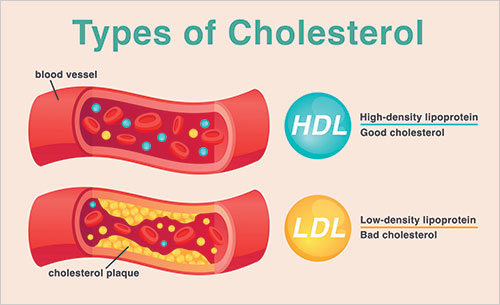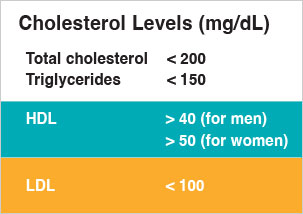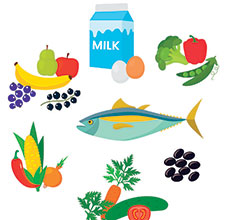Understanding Your Cholesterol
Understanding Your Cholesterol
What is Cholesterol?
Cholesterol is a fat-like substance that helps your body build cells, vitamins, and hormones. Too much cholesterol in the blood can be harmful. It can increase the risk of a heart attack and stroke, especially in people with diabetes.
Share
Check Your Cholesterol Levels
This is done with a fasting blood test known as a lipid panel that measures cholesterol and triglyceride levels.
Knowing your cholesterol and triglyceride numbers helps you understand your risk for heart disease.

 HDL cholesterol is also known as “good cholesterol”. It helps to carry cholesterol so that it can be broken down and removed from the body. Higher levels of HDL lower the risk of heart disease.
HDL cholesterol is also known as “good cholesterol”. It helps to carry cholesterol so that it can be broken down and removed from the body. Higher levels of HDL lower the risk of heart disease.
 LDL cholesterol is also known as “bad cholesterol” because it can deposit in the wall of the blood vessels and reduce blood flow.
LDL cholesterol is also known as “bad cholesterol” because it can deposit in the wall of the blood vessels and reduce blood flow.
Triglycerides are the most common type of fat in you blood and cells. They store energy in your cells from fats and sugars. A high triglyceride level is a risk factor for heart disease.
Total cholesterol is a measure of all the cholesterol in your blood.

Recommendations
This table shows optimal cholesterol levels for most adults. However, levels are different for people with diabetes or those at increased risk of heart disease and stroke.
For people with diabetes and cardiovascular disease, the optimal LDL-cholesterol level is less than 70 mg/dL.
For more tips, view: Fats and Heart Health
Form Healthy Living Habits
Begin by making small, positive steps in your daily life.

Heart Healthy Living
- Get regular exercise: 150 minutes/week.
- Lose weight if you are overweight. A 5–10 pound loss may lower blood fats.
- Limit intake of alcohol, if you drink.
- Quit smoking and vaping.
- Cholesterol medication may be needed to reach cholesterol goals.
Heart Healthy Eating Choices

- Eat plenty of fruit and vegetables; choose a wide variety.
- Use healthier fats from plants: corn, canola, olive, soybean, peanut, sunflower and avocado oil.
- Choose healthy proteins: lean cuts of meat and poultry, buffalo, elk, wild-caught fish and game.
- Eat fish twice a week. Fish like salmon and sardines have heart-healthy omega-3 fatty acids.
- Eat less high fat dairy foods like whole milk, cream, and full-fat cheese.
- Eat less fatty meat like pork or beef ribs, sausage, and processed meat like bologna and hot dogs.
- Choose whole grains instead of refined grains like white bread and white rice.
- Avoid foods and drinks high in added sugar.
What Causes High Cholesterol?
- Genetics
- Diets high in saturated fats
- Not enough physical activity
- Having excess body fat
- Smoking
- Some medications
What Increases Triglycerides?
- Added sugar in foods/drinks
- Diets high in carbohydrates and low in fiber
- Alcohol intake in excess
- Being overweight or obese
- Diets high in fat
- Uncontrolled diabetes
Saturated fat comes from animal fat in dairy and meat and from tropical fats. Examples are solid fats like butter, lard and coconut oil.


